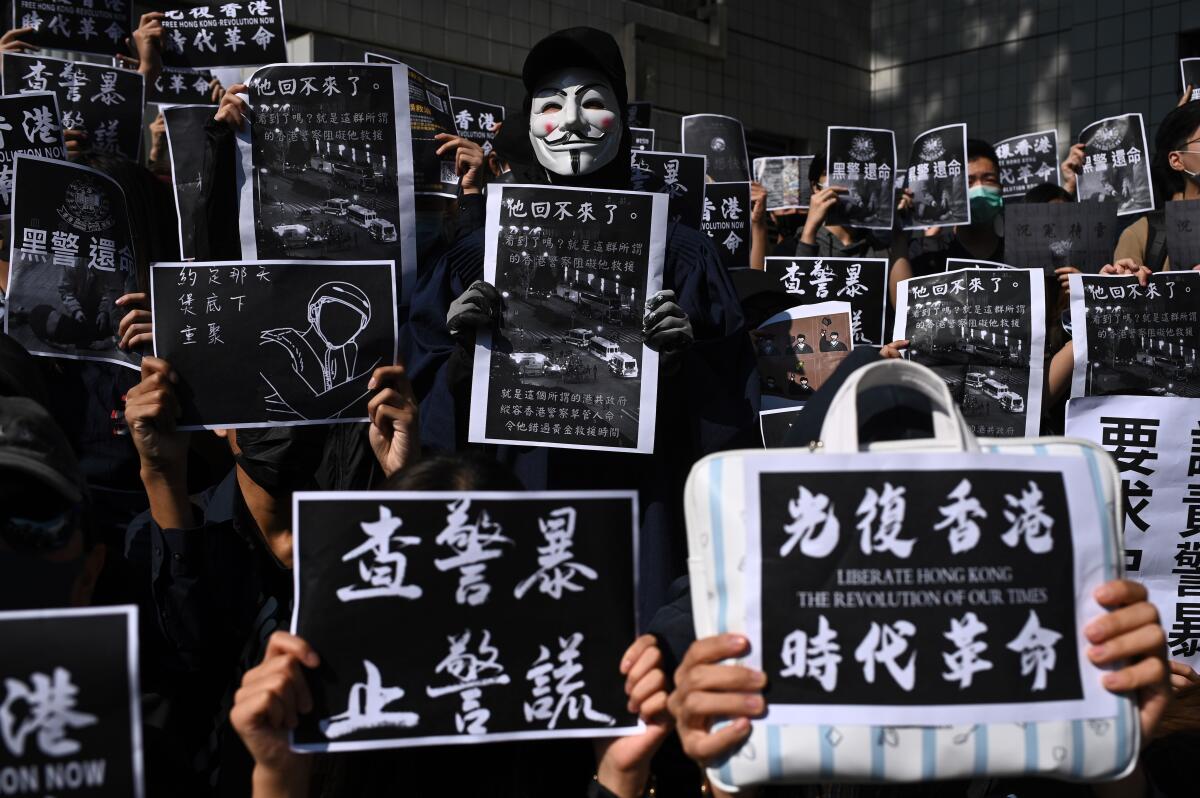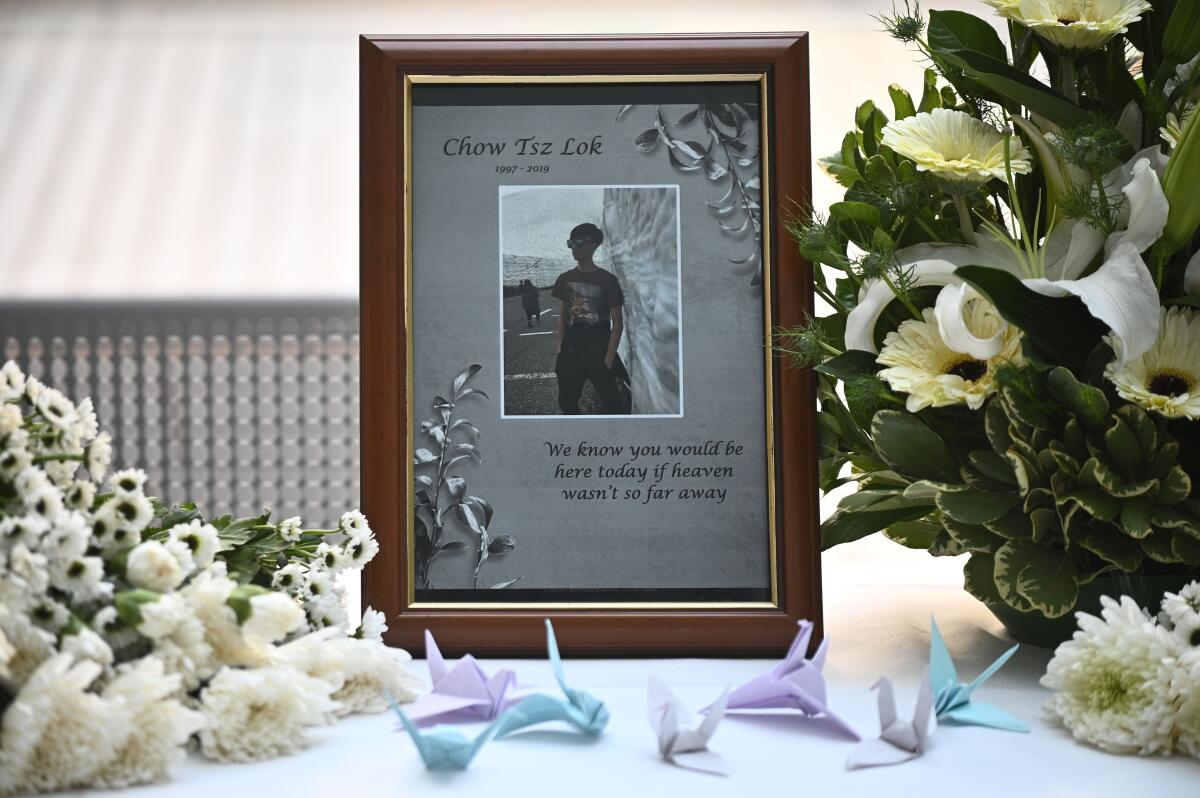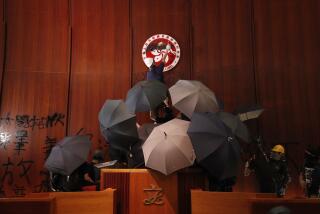Another red line is crossed in Hong Kong as a 22-year-old protester dies after fall

- Share via
HONG KONG — One after another, the red lines are breached.
Police firing live ammunition. Police beating demonstrators; demonstrators beating police. Legislators attacked with metal rods and stabbed in the chest. Two young protesters shot with live ammunition. A man biting another man’s ear off.
The latest crack in Hong Kong’s implicit social contract came Friday, when a 22-year-old student who had plunged from the third floor of a parking garage died of his injuries, triggering still more protests that were expected to continue through the weekend. It may be the first confirmed death directly linked to police action in Hong Kong’s five months of escalating political unrest.
Spontaneous demonstrations mourning the man’s death and condemning police erupted throughout the city, with hundreds chanting: “Murder must be compensated with life! A debt in blood must be paid in blood!”
Alex Chow Tsz-lok, an undergraduate student at the Hong Kong University of Science and Technology, reportedly plummeted from the third floor Sunday as he attempted to escape tear gas that police had fired into the parking structure. But key circumstances surrounding his fall remain unknown.
“Did the police pursue him and lead to his fall? Was he thrown off the car park purposely? Did the police obstruct the rescue operation to save Chow?” asked pro-democracy lawmaker Ray Chan, echoing many Hong Kongers’ misgivings.
Lack of a political solution has trapped the city in a vortex of ever-worsening violence. Beijing’s strategy is not to intervene directly with its military — the cost would be too high — but to empower Hong Kong’s government and police to crack down without giving in to protest demands, especially those for political reform and democratic voting rights.
As a result, police have arrested more than 3,000 protesters, more than a third of whom are students. They operate with a sense of impunity: Riot control squads openly call teenagers “cockroaches,” chasing them through residential neighborhoods with tear gas night after night, making mass arrests and infuriating residents who scream curses at them on the streets.
Peaceful protests have meanwhile turned into arson, vandalism and vengeful attacks on police, pro-China businesses and mainland Chinese citizens, while those who prefer nonviolence remain quiet, committed to not splitting the movement. On the streets, their chants have turned from “Hong Kongers, add oil!” — a term of encouragement — to “Hong Kongers, resist!” to, since Friday morning, “Hong Kongers, revenge!”
The most obvious way forward would be to allow a second of the protesters’ key demands: independent investigation of the police. But the administration of Hong Kong’s chief executive, Carrie Lam, and the government in Beijing show no sign of taking that step.
Earlier this week, Chinese President Xi Jinping met with Lam in Shanghai, declaring that he had “high trust” in her and “fully affirmed” her handling of the protests. “To curb the violence and stop the chaos in accordance with the law is still the most important task faced by Hong Kong,” Xi said.
The central government also recently announced special housing privileges and job opportunities for Hong Kongers in the southern provinces of mainland China — much to the chagrin of mainlanders online, who complained of being treated as second-class citizens as Beijing tries to woo Hong Kong’s youth with such economic sweeteners. But the strategy has not quelled the unrest.
The protest in which Chow was fatally injured began with protesters heckling police who were guarding a colleague’s wedding ceremony in a suburban shopping area on Sunday. As riot police arrived to clear the area, some retreated to the parking lot and threw objects at police from the upper levels. Police responded by firing tear gas at the parking lot.
According to various accounts from those at the scene, riot police dispersed first-aid volunteers and blocked paramedic access, resulting in a delay of more than half an hour before Chow received treatment. Police denied those claims at a news briefing this week.
A recent survey conducted by the Chinese University of Hong Kong found that close to half the city’s residents have zero trust in their police force, contributing to an atmosphere in which rumors thrive and official pronouncements are rarely believed unless backed by eyewitnesses and surveillance video.
“Hong Kong people’s sadness is beyond words,” Chan said. He predicted that “people will be more resolute in their call for an independent investigation and resort to all available means to demand full accountability,” further escalating protests in the coming days and weeks.
News of Chow’s death came during the university’s annual graduation ceremony Friday morning. University President Wei Shyy canceled ceremonies scheduled for the afternoon and visited the hospital where Chow had been in critical condition since Sunday. Students staged a moment of silence followed by a march while calling on Wei to denounce the actions of the police.
Some vandalized Wei’s residence and trashed several cafeterias as well as on-campus branches of Starbucks and the Bank of China — businesses that have been labeled pro-Beijing and frequently targeted in recent protests. Wei later issued a statement demanding a thorough investigation into the circumstances of Chow’s death.
“We will be outraged if there is no acceptable explanation offered,” he said.
Hong Kong police have faced widespread criticism for use of tear gas deemed excessive since protests began in June in response to a proposed extradition bill, now withdrawn, that would have allowed criminal suspects in Hong Kong to be tried by courts in mainland China.

Since then, police have fired close to 6,000 tear gas canisters in the densely packed streets of Hong Kong, affecting millions of the city’s residents. Anger at this police response has sparked a demand for an independent investigation and has helped transform what started as single-issue marches into a wide-ranging antigovernment movement.
Several young protesters died by suicide this summer, leaving notes about despair over their failure to win concessions from the government. Unverified rumors have also swirled for months surrounding extrajudicial killings of protesters and cover-ups by police.
In June, activist Marco Leung Ling-kit fell to his death after hanging an anti-extradition bill banner from the rooftop of a downtown shopping mall. Chow’s death, however, is the first linked to a clearance operation by riot police.
At a news conference Friday afternoon, police spokeswoman Sze Yuk-sim said officers had entered the parking lot prior to Chow’s fall but left long before it happened. She warned people about attending “unlawful assemblies,” referring to impromptu memorial services for Chow that sprung up across the city throughout the day.
In Hong Kong, gatherings without a “letter of no objection” from police are deemed illegal, so participants can be arrested.
In Beijing, Ministry of Foreign Affairs spokesman Geng Shuang declined to comment on Chow’s death. “At present, the most urgent thing for Hong Kong is to stop violence and restore order,” he said.
As night fell, thousands of mourners gathered at the parking lot where Chow fell. A line of people dressed in black and wearing masks snaked through all three levels of the garage. They brought white flowers and candles, waiting quietly to lay their tributes at the spot where he hit the ground.
“When I heard the news on the bus this morning, I started crying,” said Tiffany, 24, as she lighted a row of candles. Like other participants in the memorial, she asked not to disclose her full name for protection from authorities. “As a Hong Konger, I can’t accept this happening. ... This isn’t supposed to happen here.”
Since Chow was Christian, mourners did not burn the incense or paper offerings typical of traditional Chinese memorials. Instead, the air was thick with the scents of fresh-cut flowers and burning wax. A heavy silence hung over the crowd, broken only when a choir led them in a repertoire of somber hymns.
Alex, 36, a mourner dressed in a front-line protesters’ uniform of all black and a face mask, said he was both angry and sad. “But we’ve been angry for months — for years. Tonight, the sadness is greater than ever,” he said.
Later in the night, police fired tear gas and a live round in a confrontation with the mourning crowds. Some protesters set fires and built barricades.
Police also arrested or notified at least seven pro-democratic legislators of their pending arrest late Friday night, one in front of his home, for trying to obstruct a legislative meeting about the extradition bill back in May. The arrests come in advance of a local election in late November in which many expect a sweeping win for pro-democratic candidates.
The latests arrests set a dark mood for the weekend ahead, in which planned protests will probably see a fresh surge of participation amid public grief and rage.
Alex, the protester, said he wouldn’t confront the police Friday out of respect for Chow and his family. But he also vowed never to forgive the police, hinting that he’d be on the streets soon.
“I prefer to mourn on the battlefield,” he said.
Special correspondent Ho Kilpatrick reported from Hong Kong and Times staff writer Su from Beijing.
More to Read
Sign up for Essential California
The most important California stories and recommendations in your inbox every morning.
You may occasionally receive promotional content from the Los Angeles Times.














